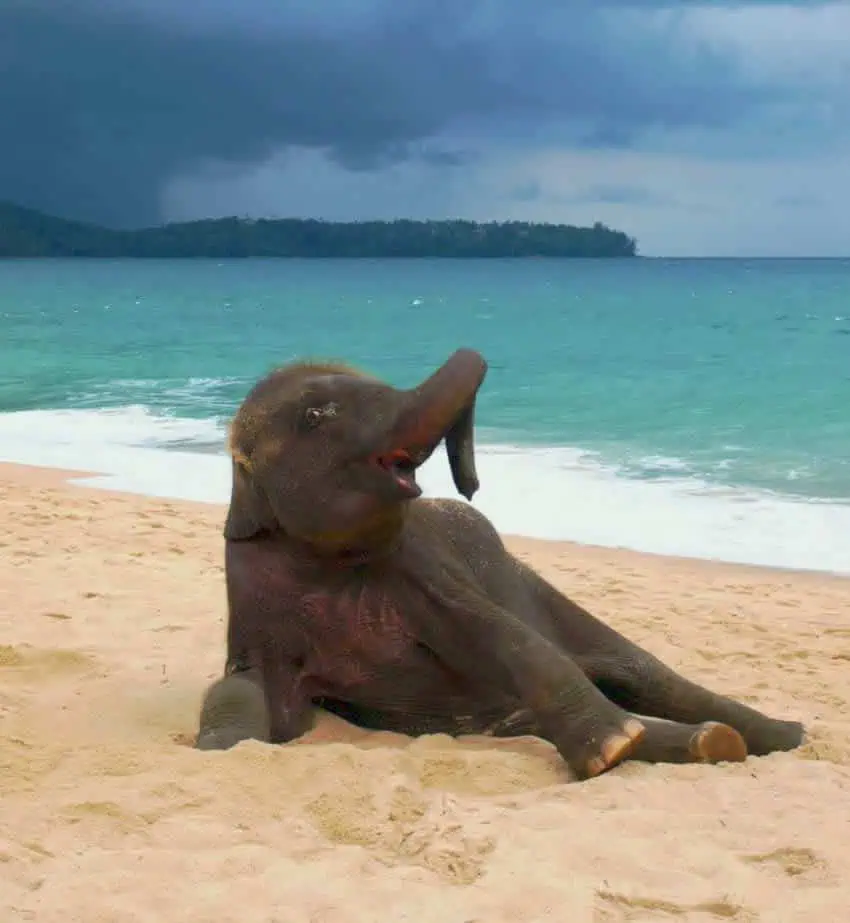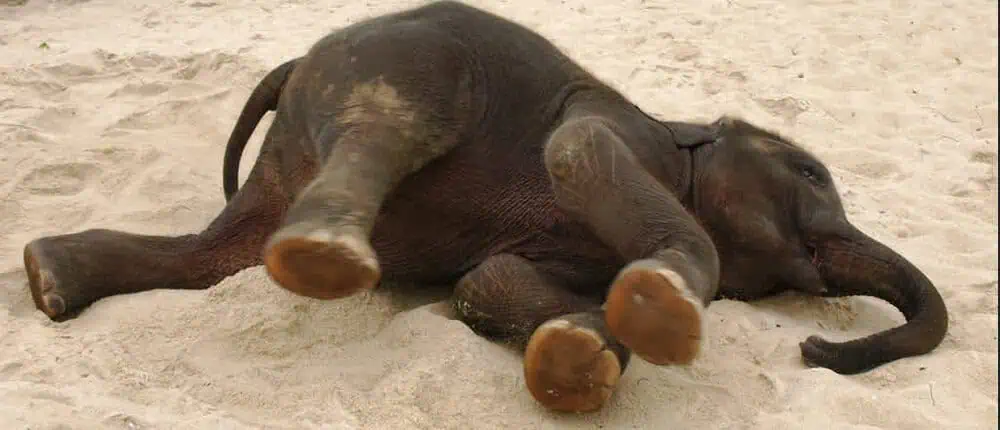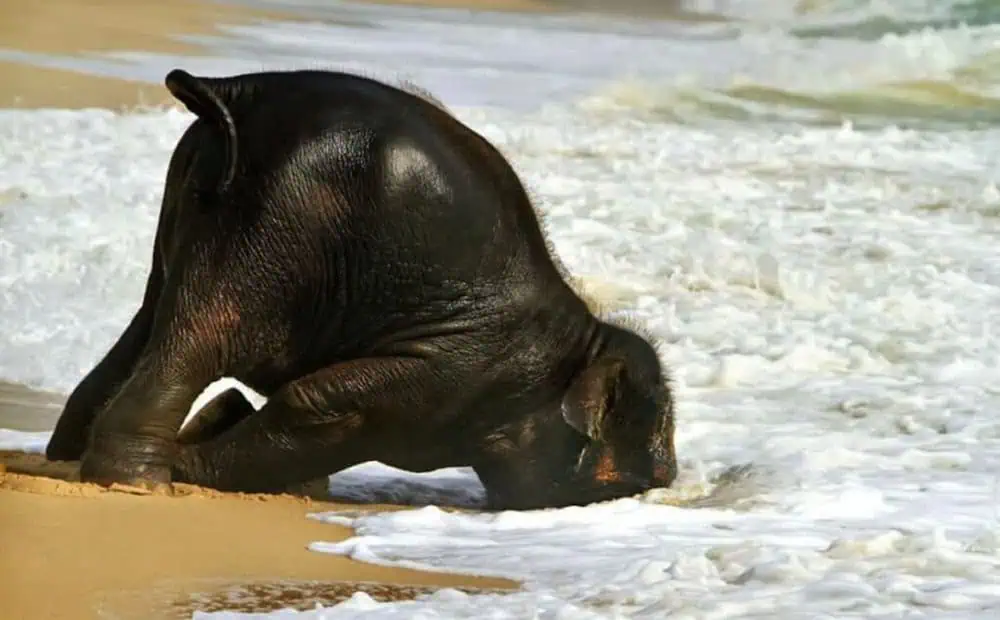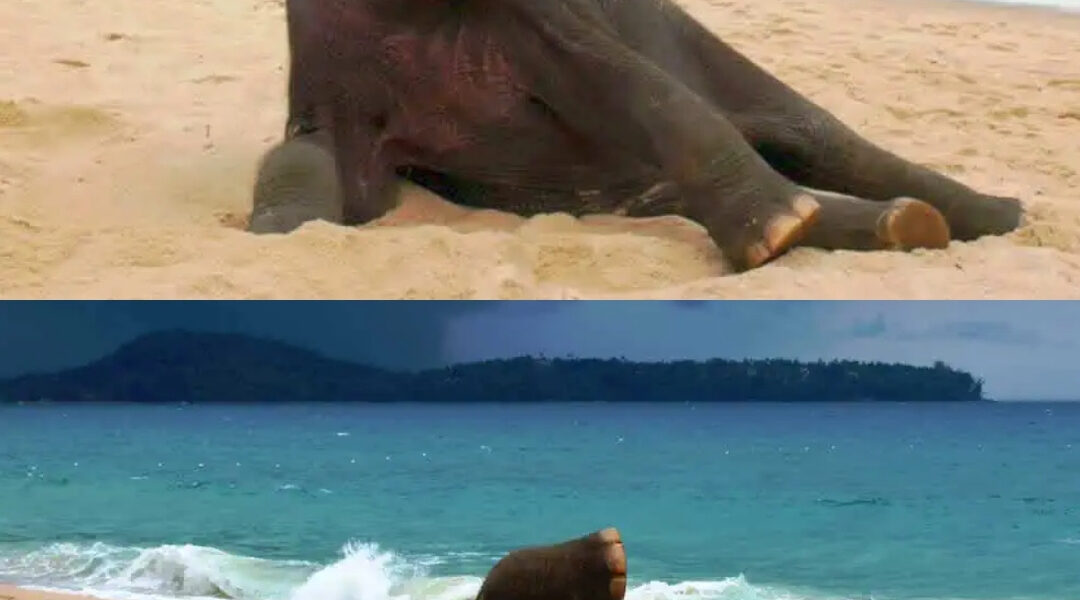
I have always dreamed of seeing elephants in the wild — not behind bars, not chained in a circus tent, but roaming free under the vast sky where they belong. Elephants have always stirred something deep within me. They are creatures of great intelligence and emotion, capable of love, empathy, grief, and play. They remember faces, hold grudges, recognize themselves in mirrors, and even appear to smile when they’re happy. They are, in every sense, among the most extraordinary beings to walk this Earth.
Recently, that quiet longing to see them free was reignited when a photographer named John Lindie captured a breathtaking scene in Phuket, Thailand. The photo showed a young elephant standing at the edge of the sea, waves lapping at its feet, as storm clouds rolled in over the horizon.

At first glance, it looked almost unreal — a wild elephant framed by the foamy surf, trunk lifted high as if to taste the salty air. But the longer you looked, the more human it felt: the joy, the curiosity, the awe. The elephant wasn’t afraid of the approaching storm. It seemed enchanted by it.
A Child of the Wild
Observers said the young elephant acted just like a child seeing the ocean for the first time — splashing, stomping, and letting the waves crash around its legs. In every flick of its tail and every rumbling trumpet, there was something pure and timeless — the universal thrill of discovery.

Scientists have long known that elephants are highly social and playful. In the wild, herds often engage in what can only be described as laughter. Calves wrestle in the mud, chase birds, and spray water at each other with their trunks, their eyes sparkling with mischief. These playful moments aren’t just fun — they are vital to bonding and emotional health, proof that joy runs deep even in the animal kingdom.
That’s what made Lindie’s photograph so powerful: it reminded people that elephants are not beasts of burden or performers for amusement — they are sentient, feeling souls, capable of wonder.
A Fading Legacy
But beneath the beauty of that image lies a harsh truth. Thailand’s wild elephants are disappearing. Once numbering in the tens of thousands, only 2,000 to 3,000 remain today — a staggering decline since the 19th century. Deforestation, poaching, and decades of human expansion have pushed them from their ancestral ranges into fragmented patches of wilderness.

Many elephants in Thailand are now domesticated, used in logging or the tourism industry. In some sanctuaries, they live better lives — fed, protected, and free from harm. But in others, their existence is one of quiet suffering, forced to perform or carry tourists for hours in the heat.
The debate continues: can human care truly replace the freedom of the wild?
Some conservation programs have found creative ways to bridge the gap. One, called Black Ivory Coffee, uses elephants to produce one of the world’s rarest and most expensive coffees. The animals consume coffee beans that are later harvested from their waste, producing a smoother flavor due to the natural fermentation process. Supporters argue it creates a sustainable income for elephant caretakers. Critics question the ethics.
Even so, the goal remains the same — to find ways for elephants and humans to coexist without exploitation or loss.
The Spirit of Play

Back in Phuket, the young elephant in Lindie’s photo became a small symbol of hope. Its carefree play in the waves reminded millions of people around the world that joy is a form of freedom — even fleeting moments of it can heal something deeper within us.
Elephants, when given space and kindness, show us how naturally life returns to balance. They play. They love. They forgive. And they remember — always.
These gentle giants can live up to 80 years in the wild, but captivity often cuts that short to around 46 years. The contrast is heartbreaking. It means generations of laughter, wisdom, and love are being lost — not because nature failed them, but because we did.
A Wish for Tomorrow

As I look at that photograph again, I imagine the young elephant running toward the surf, trunk raised in triumph, the waves crashing around it like applause. Maybe it was the first time it had ever seen the ocean. Maybe it was the first time it had ever felt free.
And I can’t help but hope that somewhere, it still is — living under the Thai sun, playing in the water, and breathing in the salt-sweet air of a life unchained.
Because elephants are not meant to live in cages or march to commands. They are meant to roam, remember, and rejoice.
The photo captured just a single moment — but within it, the world glimpsed something eternal: the joy of a free spirit rediscovering the wild.




